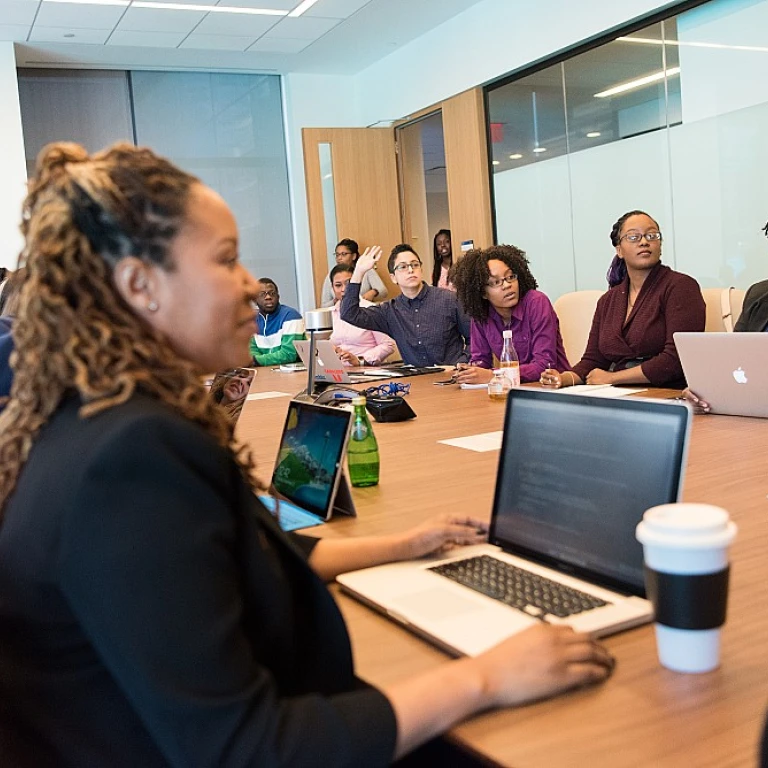Understanding the Skills Gap
Bridging the Learning Divide
The term "skills gap" refers to the disconnect between the skills that employers are seeking and the skills actually available in the labor market. This issue is becoming increasingly significant due to rapid technological advancements and evolving job requirements. Employers are consistently seeking candidates proficient in digital competencies, critical thinking, and adaptability—skills that many recent graduates lack.
As educational landscapes change, there's a pressing need to bridge this gap, particularly in fields requiring specialized knowledge. One of the primary ways to address this is through enhanced educational methods. Online tutoring is gaining attention as a potential solution, offering flexible and cost-effective training programs that can respond to industry needs quickly.
Online tutoring is not just about one-on-one tutoring sessions but a comprehensive approach inclusive of peer tutoring, professional development for tutors, and robust academic support through virtual platforms. Learning centers and tutor training programs are essential in providing the necessary resources and support to ensure that tutors can effectively help students reach academic success.
In California, a state known for its innovation in education, there's a dynamic push towards integrating these methods into higher education. This approach supports student athletes and those participating in summer institutes who benefit from learning assistance that is tailored to their unique schedules and learning styles.
To further explore how educational technology can aid in tackling the skills gap and fostering academic success,
harnessing educational technology for virtual laboratories offers insights into how tech advancements are transforming traditional learning environments.
The Role of Online Tutoring
Bridging the Divide with Digital Tools
In addressing the skills gap, online tutoring has become a pivotal factor in the transformation of educational landscapes. As technological advancements integrate into educational frameworks, the demand for diverse learning methods continues to rise. Online tutoring serves as a versatile solution by providing personalized instruction to students, regardless of their geographical location.
Interactive digital platforms have become integral in the way tutors deliver educational content to students. By facilitating both synchronous and asynchronous tutoring sessions, these platforms enhance student success through flexibility and accessibility, thus aligning with the diverse needs of learners. Students now can easily find academic support, whether face-to-face or virtually, to reinforce their understanding of complex subjects.
Moreover, online tutoring aids in writing instruction and offers learning assistance for various topics, ranging from fundamental skills to advanced professional development. By leveraging these resources, both the tutors and students benefit from an augmented educational experience, fostering academic success and student achievements.
Peer tutoring, underpinned by digital tools, also plays a vital role in supplementing traditional learning methods. Learning centers and academic support hubs implement such services to increase engagement and provide continuous learning opportunities for students.
To improve practices, many institutions have adopted comprehensive tutor training programs designed to equip tutors with effective strategies suited for online environments. This ensures that tutors maintain high levels of quality and professionalism in their instructional approaches.
Furthermore, with the advent of programs such as the summer institute, aimed at training student athletes and other specialized groups, quality education is no longer confined to traditional college or school settings. These adaptive learning models demonstrate commitment to innovation, a sentiment echoed in key conferences worldwide.
Through exploring advances like educational technology and virtual laboratories, the impact of online tutoring continues to evolve and expand, as detailed in resources like
this comprehensive guide.
As we navigate the future of education, online tutoring will remain a cornerstone of learning support, offering a pathway for students to achieve seamless academic progress and bridge the skills gap effectively.
California's Approach to Education Innovation
Embracing Innovation in Education
California has always been at the forefront of education innovation, and its approach to closing the skills gap is no exception. The state recognizes the transformative power of online tutoring and has made concerted efforts to incorporate advanced technologies and methodologies into its education system.
One of the primary initiatives focuses on leveraging the benefits of online and peer tutoring. By embracing digital platforms, California schools provide students with more flexible and accessible learning opportunities, allowing them to engage in tutoring sessions at their own pace. This approach not only aids student success but also supports the state's goal of equitable education access.
California's innovative approach is further highlighted by its push for professional development programs. These programs ensure that tutors, both in person and online, remain at the cutting edge of educational practices. Training programs, including those at the summer institute and various learning centers, are tailored to equip tutors with the skills necessary to address the diverse needs of students, thereby enhancing academic support and the overall tutoring experience.
Moreover, the state has placed a strong emphasis on fostering collaboration among educators. Conferences, both online and in person, provide a platform for sharing best design learning practices and innovative techniques in tutor training and writing instruction. These gatherings also serve as a place for exchanging resources and strategies for integrating technology into education, ultimately contributing to academic success.
In California, the integration of technological resources and training aligns closely with the objective of closing the skills gap. Initiatives like certification applications and student athlete support programs are designed with the student at the core, ensuring that every learner has the necessary tools to thrive.
To learn more about enhancing skills through practical solutions such as learning management systems, visit
Skills Gap. This resource provides insights into innovative strategies that can support both tutors and students in achieving their academic goals.
Key Online Tutoring Conferences in California
Vital Platforms for Academic Excellence in California
Attending online tutoring conferences offers a wealth of opportunities for tutors, educators, and institutions to enhance their strategies and embrace new methodologies. California, renowned for its forward-thinking approach to education, houses a variety of significant conferences that impact both students' learning journeys and tutors' professional growth.
Participating in these gatherings provides tutors with the chance to refine their practices in delivering effective student support. These conferences emphasize the importance of writing instruction, enabling tutors to guide students more effectively in this essential skill.
Moreover, college educators and students alike gain insights into innovative tutoring programs and services that are tailored to optimize student success. By exploring the latest in learning assistance and tutoring learning, attendees will learn how to apply best practices and leverage advanced education resources.
For professional tutors, these conferences double as pivotal opportunities for professional development. Many events highlight tutor training workshops and professional seminars that cover a diverse range of topics, from peer tutoring strategies to creating effective academic support systems.
With an emphasis on digital education, guests can expect to dive into sessions that explore the potential of design learning on platforms like Canvas and other online tutoring tools. By attending these conferences, tutors are better prepared to deliver quality tutoring sessions, whether in-person or online.
Given the dynamic demands of education in California, the state hosts targeted events like summer institutes that focus on specific areas such as supporting student athletes or offering advanced training programs. Such networking hubs foster an exchange of ideas and encourage the adoption of effective practices for enhancing student learning.
In summary, California's online tutoring conferences not only provide valuable insights into contemporary tutoring methods but also serve as a catalyst for fostering a robust, supportive, and innovative educational landscape.
Success Stories and Case Studies
Real-Life Examples of Online Tutoring Success in California
In the vibrant educational landscape of California, success stories emerging from online tutoring conferences have demonstrated the profound impact on both students and tutors alike. These anecdotes highlight how innovative practices have empowered students to achieve greater academic success and inspired professional development among tutors.
One standout example involves a large community college that implemented an online tutoring program focused on writing instruction. This initiative not only provided academic support to students but also gave them access to valuable resources through virtual learning assistance platforms. The college reported improved student success rates, particularly among student athletes who benefited from more flexible tutoring sessions that could accommodate their demanding schedules.
Another noteworthy story revolves around a series of peer tutoring initiatives. These programs, held during a summer institute, offered intensive training, allowing both peers and professional tutors to engage in dynamic learning experiences. Participants could actively collaborate, discuss best practices, and exchange ideas, which enriched the overall learning environment. This approach fostered a deeper understanding of the subject matter for students and enhanced the professional development of tutors.
A learning center within a major university in California adopted a hybrid model, blending person online tutoring services with in-person sessions. This strategy sought to address diverse student needs, providing comprehensive education through tailored support. As a result, there was a noticeable improvement in the academic performance of students who utilized these innovative services, demonstrating the model's efficacy.
These success stories underscore the effectiveness of implementing diverse tutoring learning strategies fostered through online conferences. The adoption of these innovative practices not only contributes to closing the skills gap but also enriches the overall educational landscape in California. The integration of such successful methods continues to inspire networks of tutors and students, setting a benchmark for future-focused learning environments through professional training programs and certification application.
Future Directions and Opportunities
Emerging Frontiers in Online Tutoring
The rise of online tutoring in California has brought new opportunities for professional development and expanded access to educational resources. Looking to the future, it's clear that these platforms will continue to evolve, offering support to students and tutors alike.
One area that shows promise is the integration of technology in creating dynamic learning environments. Online tutoring conferences in California are excellent platforms for experts to share innovations that enhance learning practices and tutor training programs. These gatherings shed light on the latest trends that facilitate learning and provide a supportive canvas for tutors to develop their skills.
California colleges and learning centers are increasingly looking to blend traditional and digital approaches to optimize student success. These educational institutions are rethinking design-learning frameworks, allowing students to access peer tutoring and training programs tailored to suit diverse needs.
For online tutors, the focus remains on advancing their skills through targeted programs and certification applications. This form of academic support ensures that tutors can offer varied and effective tutoring sessions, whether they're engaging with students in person or online.
Moreover, the need for writing instruction and center support is becoming more pronounced. As students navigate complex academic environments, structured writing assistance is crucial. By attending professional conferences and participating in summer institutes, tutors engage in continuous growth, ultimately enhancing their ability to support student learning effectively.
Looking ahead, California's education landscape continues to pave the way for innovative practices, ensuring that both tutors and students will learn and thrive in an increasingly digital world. Emphasizing professional development and academic success, the future of online tutoring in California remains bright, with countless opportunities to explore and expand.



